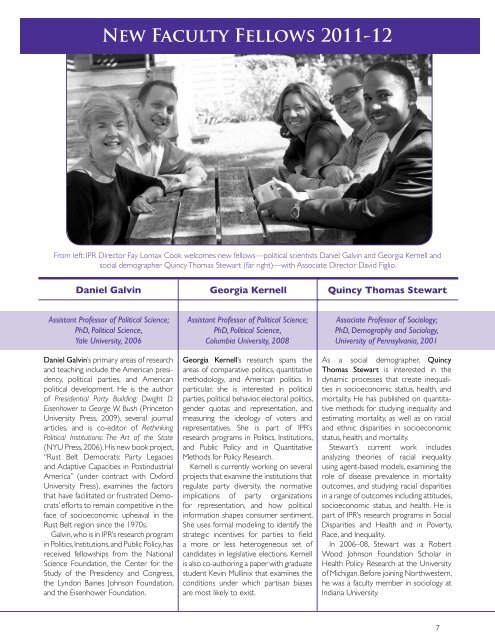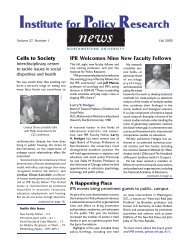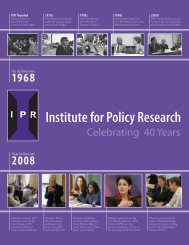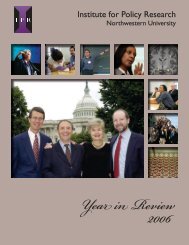Highlights of 2011 - Institute for Policy Research - Northwestern ...
Highlights of 2011 - Institute for Policy Research - Northwestern ...
Highlights of 2011 - Institute for Policy Research - Northwestern ...
You also want an ePaper? Increase the reach of your titles
YUMPU automatically turns print PDFs into web optimized ePapers that Google loves.
New Faculty Fellows <strong>2011</strong>-12<br />
From left: IPR Director Fay Lomax Cook welcomes new fellows—political scientists Daniel Galvin and Georgia Kernell and<br />
social demographer Quincy Thomas Stewart (far right)—with Associate Director David Figlio.<br />
Daniel Galvin Georgia Kernell Quincy Thomas Stewart<br />
Assistant Pr<strong>of</strong>essor <strong>of</strong> Political Science;<br />
PhD, Political Science,<br />
Yale University, 2006<br />
Daniel Galvin’s primary areas <strong>of</strong> research<br />
and teaching include the American presidency,<br />
political parties, and American<br />
political development. He is the author<br />
<strong>of</strong> Presidential Party Building: Dwight D.<br />
Eisenhower to George W. Bush (Princeton<br />
University Press, 2009), several journal<br />
articles, and is co-editor <strong>of</strong> Rethinking<br />
Political Institutions: The Art <strong>of</strong> the State<br />
(NYU Press, 2006). His new book project,<br />
“Rust Belt Democrats: Party Legacies<br />
and Adaptive Capacities in Postindustrial<br />
America” (under contract with Ox<strong>for</strong>d<br />
University Press), examines the factors<br />
that have facilitated or frustrated Democrats’<br />
ef<strong>for</strong>ts to remain competitive in the<br />
face <strong>of</strong> socioeconomic upheaval in the<br />
Rust Belt region since the 1970s.<br />
Galvin, who is in IPR’s research program<br />
in Politics, Institutions, and Public <strong>Policy</strong>, has<br />
received fellowships from the National<br />
Science Foundation, the Center <strong>for</strong> the<br />
Study <strong>of</strong> the Presidency and Congress,<br />
the Lyndon Baines Johnson Foundation,<br />
and the Eisenhower Foundation.<br />
Assistant Pr<strong>of</strong>essor <strong>of</strong> Political Science;<br />
PhD, Political Science,<br />
Columbia University, 2008<br />
Georgia Kernell’s research spans the<br />
areas <strong>of</strong> comparative politics, quantitative<br />
methodology, and American politics. In<br />
particular, she is interested in political<br />
parties, political behavior, electoral politics,<br />
gender quotas and representation, and<br />
measuring the ideology <strong>of</strong> voters and<br />
representatives. She is part <strong>of</strong> IPR’s<br />
research programs in Politics, Institutions,<br />
and Public <strong>Policy</strong> and in Quantitative<br />
Methods <strong>for</strong> <strong>Policy</strong> <strong>Research</strong>.<br />
Kernell is currently working on several<br />
projects that examine the institutions that<br />
regulate party diversity, the normative<br />
implications <strong>of</strong> party organizations<br />
<strong>for</strong> representation, and how political<br />
in<strong>for</strong>mation shapes consumer sentiment.<br />
She uses <strong>for</strong>mal modeling to identify the<br />
strategic incentives <strong>for</strong> parties to field<br />
a more or less heterogeneous set <strong>of</strong><br />
candidates in legislative elections. Kernell<br />
is also co-authoring a paper with graduate<br />
student Kevin Mullinix that examines the<br />
conditions under which partisan biases<br />
are most likely to exist.<br />
Associate Pr<strong>of</strong>essor <strong>of</strong> Sociology;<br />
PhD, Demography and Sociology,<br />
University <strong>of</strong> Pennsylvania, 2001<br />
As a social demographer, Quincy<br />
Thomas Stewart is interested in the<br />
dynamic processes that create inequalities<br />
in socioeconomic status, health, and<br />
mortality. He has published on quantitative<br />
methods <strong>for</strong> studying inequality and<br />
estimating mortality, as well as on racial<br />
and ethnic disparities in socioeconomic<br />
status, health, and mortality.<br />
Stewart’s current work includes<br />
analyzing theories <strong>of</strong> racial inequality<br />
using agent-based models, examining the<br />
role <strong>of</strong> disease prevalence in mortality<br />
outcomes, and studying racial disparities<br />
in a range <strong>of</strong> outcomes including attitudes,<br />
socioeconomic status, and health. He is<br />
part <strong>of</strong> IPR’s research programs in Social<br />
Disparities and Health and in Poverty,<br />
Race, and Inequality.<br />
In 2006–08, Stewart was a Robert<br />
Wood Johnson Foundation Scholar in<br />
Health <strong>Policy</strong> <strong>Research</strong> at the University<br />
<strong>of</strong> Michigan. Be<strong>for</strong>e joining <strong>Northwestern</strong>,<br />
he was a faculty member in sociology at<br />
Indiana University.<br />
7

















